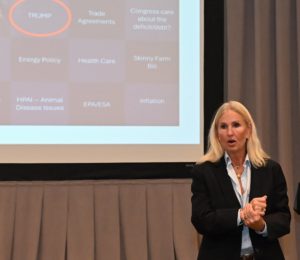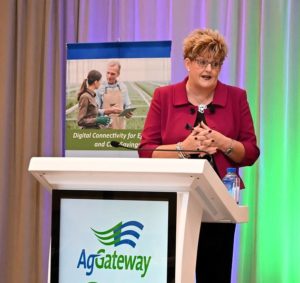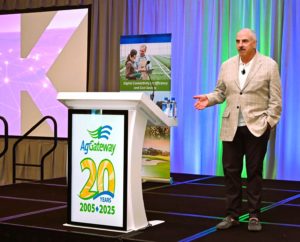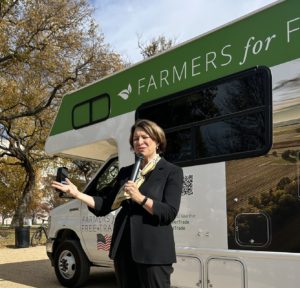 Case IH is doubling down on power and productivity at AGRITECHNICA 2025 in Hanover, Germany this week. From the Case IH Steiger® 785 Quadtrac®, to the new Optum series Optum™ 440, as well as the Farmall® 120 M, and the completely reimagined Puma® 185, every machine is designed to push performance forward.
Case IH is doubling down on power and productivity at AGRITECHNICA 2025 in Hanover, Germany this week. From the Case IH Steiger® 785 Quadtrac®, to the new Optum series Optum™ 440, as well as the Farmall® 120 M, and the completely reimagined Puma® 185, every machine is designed to push performance forward.
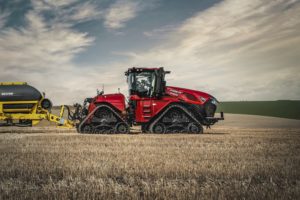 The new Steiger® 785 Quadtrac® increases the iconic tractor’s horsepower by almost 10% over the previous model with 853 peak hp. The higher horsepower has a purpose and drives productivity, allowing farmers to handle larger implements or pull the same implements even faster, offering an impressive 40% torque rise. Designed to provide more power to the ground, the Steiger 785 Quadtrac also offers a superior operator experience and cab comfort.
The new Steiger® 785 Quadtrac® increases the iconic tractor’s horsepower by almost 10% over the previous model with 853 peak hp. The higher horsepower has a purpose and drives productivity, allowing farmers to handle larger implements or pull the same implements even faster, offering an impressive 40% torque rise. Designed to provide more power to the ground, the Steiger 785 Quadtrac also offers a superior operator experience and cab comfort.
 Case IH is previewing the new Optum® series tractors available in three models: 360, 390, and 440 – offering greater year-round productivity and increased comfort. The Optum series tractors deliver high horsepower performance and are ideal for a wide range of applications from tillage and seeding, to baling or transport. The Optum series also offers an all-new independent front axle suspension paired with upgraded braking, transmission and hydraulics.
Case IH is previewing the new Optum® series tractors available in three models: 360, 390, and 440 – offering greater year-round productivity and increased comfort. The Optum series tractors deliver high horsepower performance and are ideal for a wide range of applications from tillage and seeding, to baling or transport. The Optum series also offers an all-new independent front axle suspension paired with upgraded braking, transmission and hydraulics.
 The new Farmall® M series tractor is designed to deliver power and performance in everyday applications through to the most demanding tasks. With seamlessly integrated technology and heightened operator comfort, the Farmall M series delivers superior productivity and execution, regardless of the operation size or terrain. The Farmall M – available in 100M, 110M and 120M models – was created to handle an operator’s busiest days, continuing the Farmall legacy of dependability.
The new Farmall® M series tractor is designed to deliver power and performance in everyday applications through to the most demanding tasks. With seamlessly integrated technology and heightened operator comfort, the Farmall M series delivers superior productivity and execution, regardless of the operation size or terrain. The Farmall M – available in 100M, 110M and 120M models – was created to handle an operator’s busiest days, continuing the Farmall legacy of dependability.
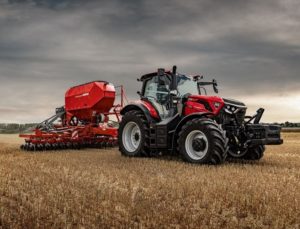 Finally, Case IH is unveiling the all-new Puma® series tractor, featuring an entirely new vehicle design that allows operators to enjoy a smoother ride with superior maneuverability as well as access to the latest precision technology. The Puma – available in 155, 165 or 185hp models – sets a new standard of performance and efficiency for varying operational needs. Featuring an advanced CVXDrive™ transmission, the Puma offers improved load handling, traction and working speeds, allowing operators to use power more economically. Costs are lowered thanks to efficient fuel consumption, and productivity increases with long 750-hour service intervals and the powerful FieldOps™ platform.
Finally, Case IH is unveiling the all-new Puma® series tractor, featuring an entirely new vehicle design that allows operators to enjoy a smoother ride with superior maneuverability as well as access to the latest precision technology. The Puma – available in 155, 165 or 185hp models – sets a new standard of performance and efficiency for varying operational needs. Featuring an advanced CVXDrive™ transmission, the Puma offers improved load handling, traction and working speeds, allowing operators to use power more economically. Costs are lowered thanks to efficient fuel consumption, and productivity increases with long 750-hour service intervals and the powerful FieldOps™ platform.
If you happen to be attending Agritechnica this week, be sure to visit Case IH, located in Booth B21, at Hall 3. If not, visit caseih.com or talk with your local Case IH dealer.
 AgGateway had a successful annual meeting last week in Clearwater, Florida to celebrate 20 years and work on building the future on two decades of achievement.
AgGateway had a successful annual meeting last week in Clearwater, Florida to celebrate 20 years and work on building the future on two decades of achievement.






